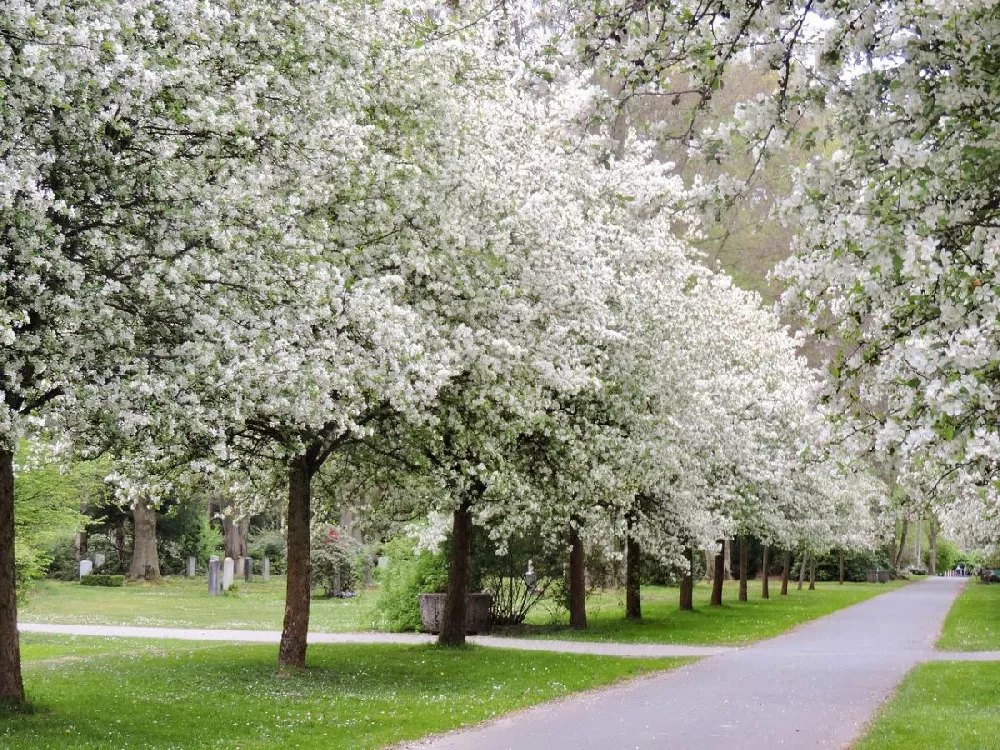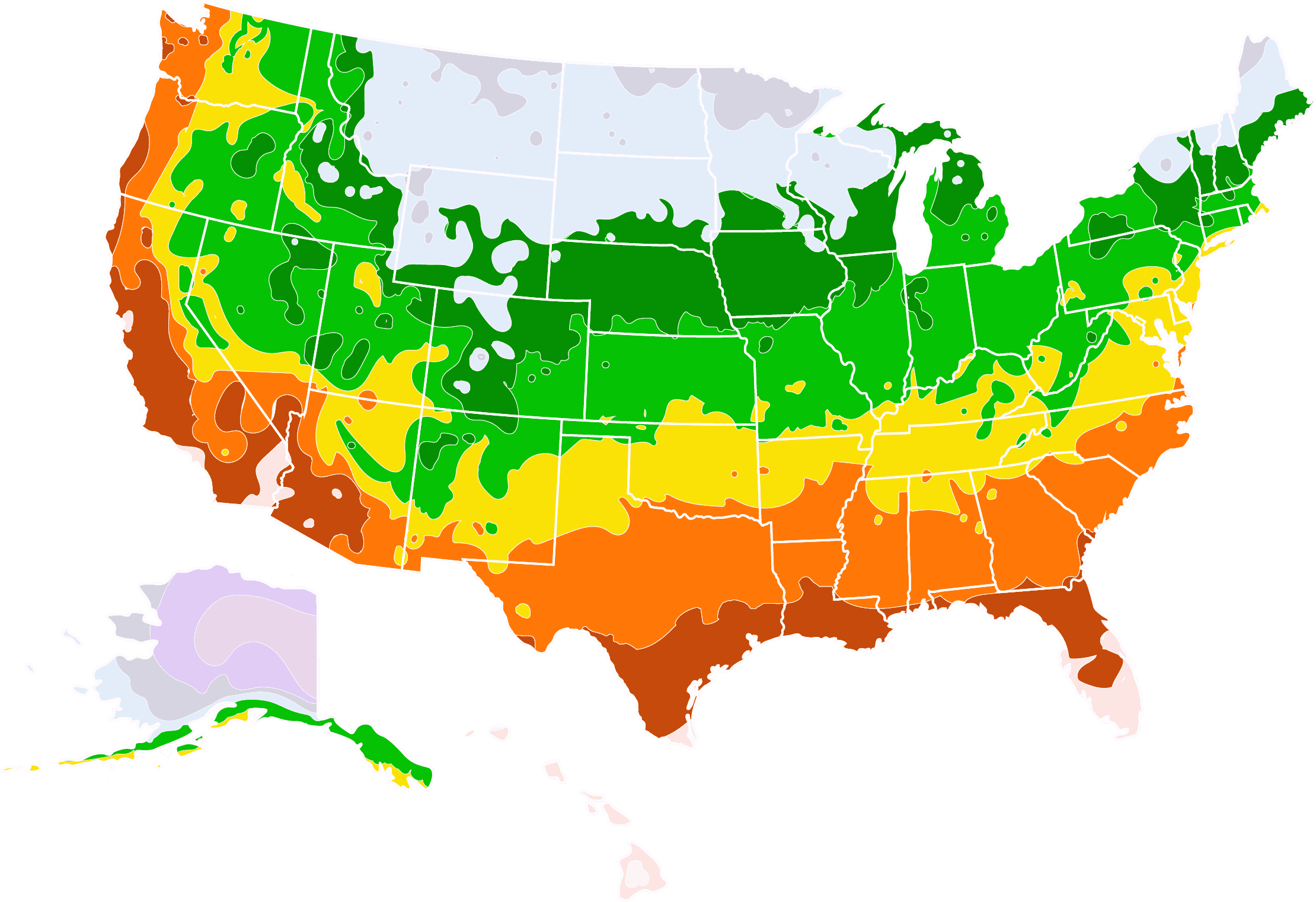- Home >
- Flowers >
- Trees and Plants with White Flowers >
- Spring Snow Flowering Crabapple Tree
Spring Snow Flowering Crabapple Tree for Sale - Buying & Growing Guide
- Ships in 1-2 days
- 1-Year Warranty Eligible
- Pots or accessories are not included unless specified in the product options.
Shipping Details:
Once your order is shipped, you’ll receive an email with a tracking number and estimated delivery date. Most orders ship immediately, but some items are seasonal and may only ship in spring or fall. These products are noted on the website.
The Spring Snow flowering crabapple tree, Malus 'Spring Snow,' is a stunning example of the genus, with brilliant white flowers that blanket the tree every spring. But there's an added bonus — this cultivar is a fruitless hybrid, so you won't have to deal with the mess that most crabapples make when they drop their fruit. The Spring Snow crabapple tree is attractive throughout the year. Following the spring blossoms, the tree produces glossy dark green leaves that turn a vivid yellow in fall. In winter, the oval silhouette of the tree is an eye-catching contrast to snowy landscapes. Here are a few more reasons to invite a Spring Snow flowering crabapple to your garden:
- It is tolerant of urban pollution, making it a great choice for city yards.
- The Spring Snow flowering crabapple tree grows throughout most of the continental U.S.
- Its spring flowers emit a pleasant fragrance.
Plant Care
Sunlight

The Spring Snow crabapple tree thrives in full sun, with at least six to eight hours of direct light a day.
Watering
This cultivar needs about an inch of water a week until established; at that point water only during droughts.
Fertilizing

Fertilize in spring with a balanced, slow-release fertilizer designed for landscape trees and shrubs.
Planting and Care
Planting instructions
Site your Spring Snow crabapple tree in a spot with good sun, in soil that drains well. Unpot your sapling, and tease out any encircling roots, which can girdle the tree and slowly kill it. Dig a hole that’s as deep as the root ball and twice as wide. Place your tree in the hole, spreading out the roots carefully. Fill in around the roots with topsoil, tamping down as you go to eliminate air pockets. Water thoroughly. Apply a 2- to 3-inch layer of an organic mulch, such as bark chips, around the root zone, keeping it from touching the trunk itself to avoid rot.
Watering and nutrients
Water a newly-planted tree several times a week until you start to see robust new growth on the branches. Then taper back to once a week, giving the tree about an inch of water each time. A mature Spring Snow crabapple tree will only need supplemental watering during very hot or dry weather. Crabapple trees are not heavy feeders, but you can give your tree a light feeding in spring of a balanced, slow-release formula designed for landscape trees and shrubs, such as a 10-10-10 formula.
Pollination
As a sterile hybrid, this cultivar doesn’t require pollination, although you may see pollinating insects on the flowers. You will not, however, end up with the small apples that are the end result of pollination for most crabapples.
Pruning
The Spring Snow crabapple tree has a pleasing oval shape naturally, so you will need to do little pruning for shape. Prune out any broken, diseased, or damaged branches whenever you see them.
Pests, diseases, and animals
Insects that may appear on your crabapple include aphids, webworms, and scale insects. A healthy tree can fight off minor infestations, and an application of horticultural oil will help eliminate scale insects. If you see evidence of tent caterpillars, spray your tree with Bacillus thuringiensis (Bt) to remove them. The Spring Snow cultivar is resistant to many common crabapple diseases. Watch for fire blight, which manifests as brown leaves that appear to have burned. Prune out infected branches.
Achieving maximum results
Knowing the best way to include a new plant into your existing landscape is one way to achieve maximum results. The Spring Snow flowering crabapple works well as a specimen tree, planted either alone or in groupings of three or five in a prominent spot in your front yard, where it will be easily visible during its spring bloom time. Try planting shade-loving perennials, such as astilbes and hostas, under it to provide added interest. Because it is tolerant of urban pollution, this cultivar is often used near roadways and on highway medians. It’s also a good choice to line a driveway, walkway, or patio because there is no need to sweep up messy fruit in fall.
FAQs
Where can I grow a Spring Snow flowering crabapple?
How big does this cultivar get?
When sited in full sun and well cared for, a Spring Snow crabapple tree can reach a mature height of 20 to 25 feet and a mature width of 15 to 20 feet. Because of this, it's best to avoid planting it under low overhead utility cables. If planting near a building, leave about 10feet between the structure and the tree.
Is the Spring Snow flowering crabapple tree toxic?
Yes. It is toxic to cats, dogs, and horses. For this reason, do not use sticks from this tree when you play with your dog, and if you have horses or other livestock, avoid planting it near or in their pastures.
Compare Similar Products
You can't add more Product Name - Product size to the cart.
OK








